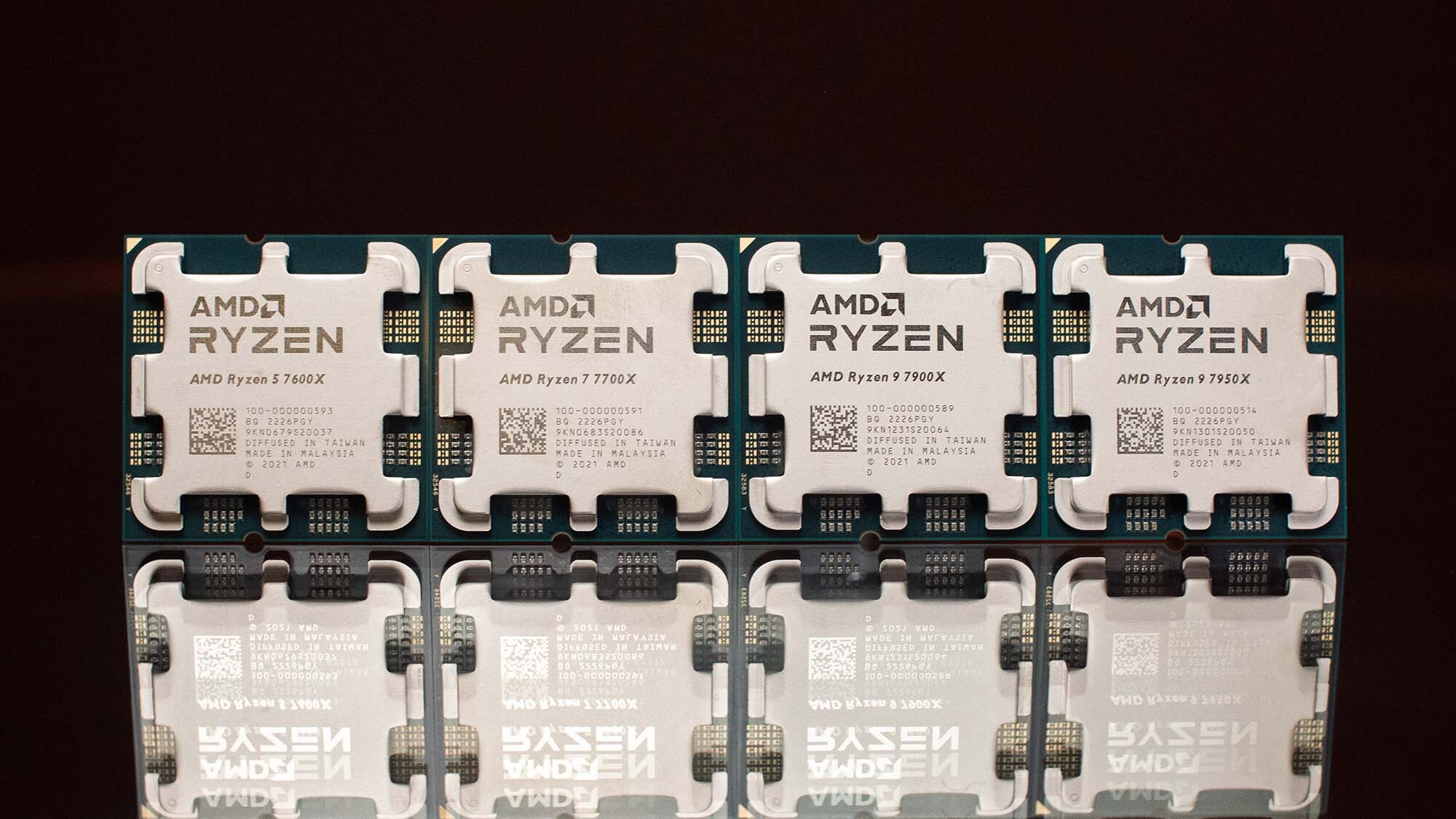AMD Ryzen 7 7700X leaks suggest a CPU that could be a handful for Intel
One leaked benchmark shows the 7700X pipping Intel’s Alder Lake flagship

AMD’s Ryzen 7 7700X processor has been glimpsed in a couple of leaked benchmarks which show an impressive performer in many respects.
The 7700X was flagged up in a CPU-Z test (now deleted) which was posted on Twitter by renowned leaker Tum_Apisak (courtesy of Tom’s Hardware).
AMD Ryzen 7 7700XSingle-Thread pic.twitter.com/x21uwS1BjqSeptember 8, 2022
The next-gen AMD processor managed to attain 774 in single-thread, and a score of 8,381 in multi-thread. The latter shows the 7700X just edging out Intel’s flagship Core i9-12900K by 1%, and compared to the Core i7-12700K, the AMD chip was 8% faster. Put that multi-core result up against the Ryzen 7 5800X, and the incoming CPU is 28% quicker.
For single-thread, the picture doesn’t look so great for AMD, with the 7700K falling behind the 12700K in this case, and being about equal to the 12600K in fact (the Ryzen processor was 1% faster than the latter). The 7700K did beat the 5800X by 21% in single-thread, though.
Tum_Apisak also provided a screenshot in CPU-Z showing the retail version of the 7700X (apparently a model sent to a reviewer) boosting to 5425MHz across all cores, which very slightly outdoes the officially rated boost of 5.4GHz (by 25MHz – of course, depending on what quality chip you get, a 7700X could be capable of a putting its foot down a bit more than that during max boost).
That grab also shows the TDP of 105W for the processor, and that the 7700X was tested in a Gigabyte X670E Aorus Master motherboard with DDR5-6400 system RAM.
Another leak flagged by VideoCardz further shows the Ryzen 7 7700X in Geekbench, hitting 2,209 for single-core and 14,459 for multi-core, easily passing the Core i7-12700K by a 16% margin in the former, but ending up much closer in multi-core at just 2% in favor of the AMD processor.
Get daily insight, inspiration and deals in your inbox
Sign up for breaking news, reviews, opinion, top tech deals, and more.
Analysis: Zen 4 looking promising, but let’s not get carried away
This will be the Zen 4 CPU that a lot of people will have their eyes on, as it’s in the sweet spot of an 8-core model. While lots of folks still have 6-core (or indeed quad-core) processors, 8-core chips are making rapid progress, and they’re what you really need to be looking at in terms of future-proofing these days. The 7700X remains a relatively affordable CPU at $399 (about £345 / AU$590), certainly compared to the 5800X which debuted at the launch of Zen 3 and was $50 pricier in the US (there was no 5700X model at launch with the Ryzen 5000 range).
As ever, we need to be very cautious about any early benchmark leaks, but should Intel be worried here? Well, the 7700X does put in an impressive showing to marginally outdo the Core i9-12900K for multi-threaded performance, but we need to take CPU-Z benchmarks with more seasoning than normal in terms of reflecting real-world performance (and, of course, the gaming frame rates many folks will be really interested in).
Single-thread performance for AMD looks wonkier, but again, don’t put too much stock in these pre-release comparisons with CPU-Z (although the outgoing 5800X is handily outmaneuvered).
What we also have to remember is that Intel has its own next-gen range of processors, Raptor Lake, close to launch now, with not just IPC (instructions per clock) gains, but also a bunch more efficiency cores heaped on compared to Alder Lake (double in the case of the 13th-gen flagship, and the 13700K). So going by the above Geekbench result for the 7700X, it just outdoes the current 12700K by 2% in multi-core, but with the generational gains for the 13700K, and the doubling up of efficiency cores (8 instead of 4), well, when Team Blue’s next-gen rival rolls out, these comparisons could look quite different.
Ultimately we’ll only know when that happens, but for now, we’ll keep repeating what we’ve asserted in the recent past: that it still looks like both Ryzen 7000 and Raptor Lake are going to push forward nicely with performance, and decisions may well be made on the basis of other factors. By that we mean elements like cost comparisons, and upgrading to an all-new platform in the case of AMD (13th-gen Intel CPUs will still be good with Alder Lake motherboards, but won’t offer any further upgrade path going forward).
Oh, and patience could play an important role, as AMD is going to be on the scene with next-gen CPUs in just a few weeks, whereas Raptor Lake is seemingly looking at mid-October, or maybe slightly later, for its release timeframe. And with Team Red supposedly going to have a high-volume launch, leaving scalpers out in the cold – with Raptor Lake rumor pedlars worrying about pricing for a while now, with Intel looking to hike price tags on some of its chips for sure – there are certainly reasons to believe AMD will have some key advantages in the next-gen CPU battle.
Darren is a freelancer writing news and features for TechRadar (and occasionally T3) across a broad range of computing topics including CPUs, GPUs, various other hardware, VPNs, antivirus and more. He has written about tech for the best part of three decades, and writes books in his spare time (his debut novel - 'I Know What You Did Last Supper' - was published by Hachette UK in 2013).